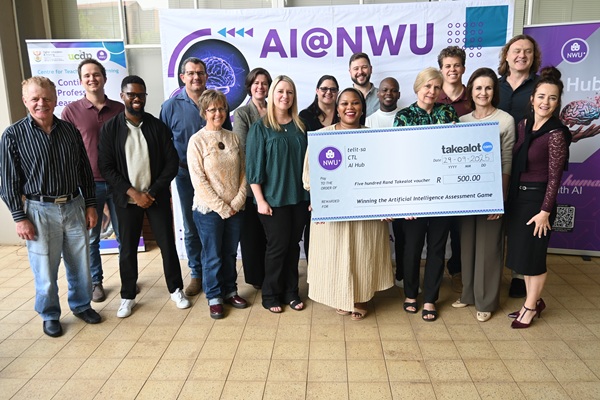In a joint effort to strengthen digital capability, the office of the Senior Deputy Vice-Chancellor: Teaching and Learning, AI Hub, Centre for Teaching and Learning (CTL), and the People and Culture division launched an innovative incentive programme to encourage North-West University (NWU) academic staff to complete an AI and Assessment course.
A total of 800 Takealot vouchers, each valued at R500, were made available to the first 800 lecturers who successfully completed the full course. This initiative forms part of the NWU’s commitment to integrating artificial intelligence (AI) into teaching, learning, and assessment practices, equipping lecturers with the necessary skills to embrace digital transformation in higher education.
To qualify, lecturers had to complete all 11 parts across three sections of the AI and Assessment course. Successful completion resulted in the awarding of 15 digital badges, which could be included in end-of-year performance appraisals. Each section required participants to complete multiple-choice assessments with a score above 80% and to submit a Portfolio of Evidence (PoE). The PoE demonstrated engagement with course materials and activities and was evaluated by a moderator before the final section badge was issued.
During a celebratory event, Prof Linda du Plessis, senior deputy vice-chancellor for teaching and learning, Prof Liandi van den Berg, director of the TELIT-SA research entity, and Prof Anné Verhoef, director of the NWU AI Hub, commended the recipients for their dedication and perseverance.
Prof du Plessis emphasised the importance of AI in shaping the future of higher education and noted that the NWU is making significant progress in this field. Prof Verhoef acknowledged that the course was time-consuming and demanding but praised participants for their commitment to completing it successfully. Prof van den Berg also congratulated the lecturers, highlighting their effort and enthusiasm in embracing new learning technologies.
Feedback from participants was overwhelmingly positive. Many expressed that the course not only enhanced their understanding of AI but also equipped them to guide their students in using AI tools responsibly and ethically. As one participant remarked,
“AI is here to stay, and as educators, we must know how to use it effectively and ethically.”
Some of the dedicated NWU academic staff who successfully completed the AI and Assessment course were celebrated for their achievement. While not all recipients could attend the event, those present were applauded for their commitment to advancing digital teaching and learning through the responsible integration of AI.

